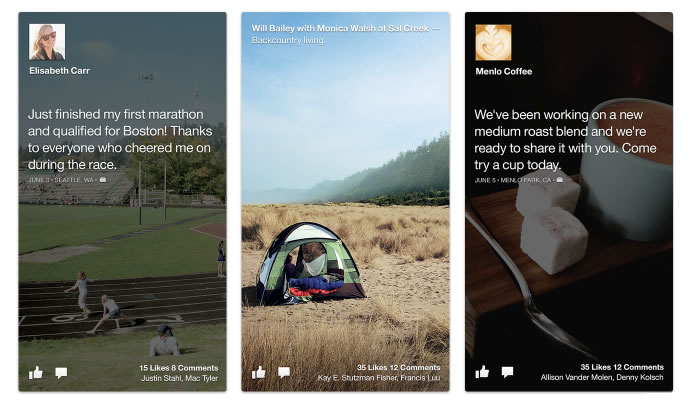All the signs were there, hence the years of rumors about a potential "Facebook phone". But as it turns out Facebook didn't delve into hardware or even as deep as developing a new mobile operating system. Instead, the company is leveraging Android's openness, adding a layer on top of the popular OS, and making its multiple services more widely available across (or should I say, front and center) the phone's interface. They are particularly taking over the lock and home screens (see the video below).
The ultimate goal, make Facebook more ubiquitous than it already is. They won't admit it now, but if Facebook Home, as they are calling it, gains any real traction they will look into monetizing those users as well. But for now, Facebook will simply try to get wider adoption from hardcore users of the social network and from users of the popular photo sharing service Instagram.

They are also partnering with HTC for a mid-range Facebook device, the HTC First. So again, it's as if the Facebook phone existed but they didn't had to go through the trouble of labeling so, committing to support it, or risking millions on banking such a project. A certain novelty factor could mean HTC is actually paying for the exclusivity, but over the longer term Facebook may be willing subsidize phone costs if their service is built into devices, a business model resembling that of Windows PC manufacturers.
When the Android "app" launches next April 12 it will available for a small number of Samsung and HTC smartphones, with full support for all Android devices, tablets included, coming down the line.
Personally, I'm on Facebook but I don't use it enough to even justify having the app on my phone, let alone putting it on top of everything else. Mark Zuckerberg tried to sell the idea of Home on a more positive light, talking about a paradigm shift from a device full of apps to one that is design around people.
Let's not forget Facebook remains at large a closed ecosystem, but there's likely a market for this among the millions of Facebook users who rely on it to message friends, take photos and even play games. You might recall an editorial that fellow editor Shawn Knight wrote last year on how he was forced back into Facebook since they had exclusive rights for UFC content, among others. Once again what we see here is Facebook playing to its strengths, so a wise business move any way you cut it.
Here's a short compendium of opinions about FB Home from across the web:
Mat Honan, Wired:
Facebook Home doesn't even have to be a hit. At least not right away. The important thing is that it's out there, and it didn't require a lot of up-front capital or R&D investment in hardware. It's a better strategy than anything else the company has done in mobile.
Dan Frommer, Splat F:
I also don't expect hardcore Android users --- the type of people who buy and love Samsung Galaxy Notes, or Google Nexus devices --- to jump to Facebook devices. That's not the target audience.
Farhad Manjoo, Slate:
I know what you're thinking: I don't want Facebook to take over my phone! I like apps! This is super terrible! What the heck is this world coming to?! Yes, yes, I feel the same way. But I'm a thirtysomething fellow who writes for a living and you're the kind of person who reads essays about technology; in other words, you and I are probably too old and stodgy for this anyway.
Alexis Madrigal, The Atlantic:
As for the actual product itself, Facebook Home looks nice. It's pretty. The interface works in ways that will be easy to learn and understand. If it works as demo'd, I agree with Zuckerberg that it will be "the best version of Facebook there is."
Tim Carmody, The Verge:
Ultimately, it's a clash of styles. Compare Facebook Home to Google Now. [...] For Facebook, Google is both a problem and an opportunity. For Google, Facebook is mostly just a problem.
Danny Sullivan, Search Engine Land:
So how are these Facebook folks who've been using the Facebook Home already conduct searches? They open up Chrome, then search from within there. Plenty of people search in a similar way on iOS devices, by going through Safari or an alternative browser like Chrome. But for those used to one-touch "app-less" search, Facebook Home makes that harder.
Ken Yeung, TNW:
Today, Facebook is furthering its information gathering by moving beyond the apps and the social networks that it controls by tapping straight into your phone.
Miguel Helft, CNN:
Facebook's major announcement really amounts to one thing: The social network is using the search giant's own platform against it.